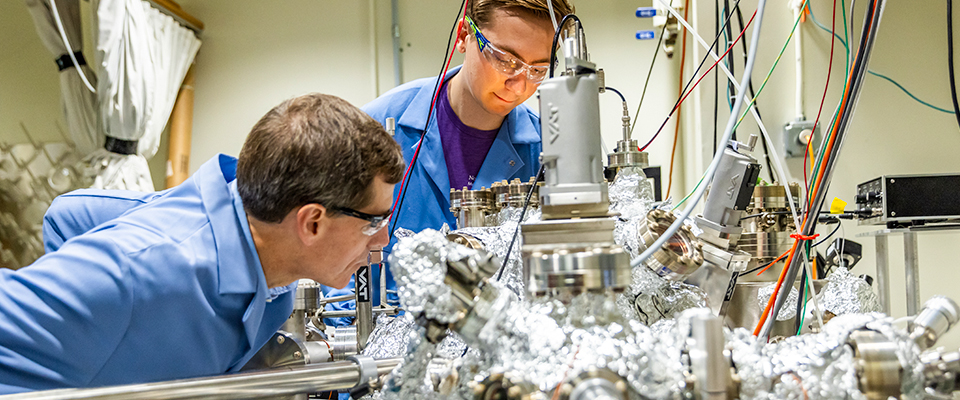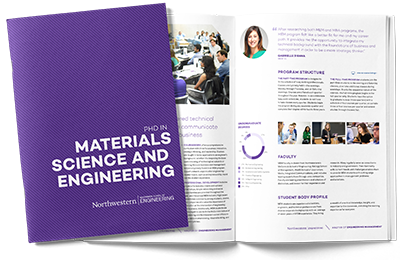Consistently ranked in the top 5 programs in the nation
according to US News and World Report.

Since establishment as the world’s first materials science academic department, Northwestern Engineering has led and defined the frontier of material research, enabling transformative technologies that improve lives.
Northwestern Engineering’s PhD program in materials science and engineering was the first in the world and is internationally renowned for the excellence of its graduates. With distinguished faculty, acclaimed research centers, and state-of-the-art laboratories and classrooms, the program is designed to meet the global demand for analytical and innovative problem solvers by using a transdisciplinary approach to connect fundamental science, driven by curiosity and the thrill of discovery.
To pursue a broad range of research, we actively seek students with diverse backgrounds and undergraduate training, including physicists, chemists, and engineers from other disciplines.
Join our internationally recognized materials community
The first academic department of its kind in the world, the Department of Materials Science and Engineering at Northwestern University leads the field in materials innovation and education.
according to US News and World Report.
Seven faculty rank in the top 1% of citations in materials science and chemistry according to Clarivate.

including Northwestern’s Feinberg School of Medicine
Strong interdisciplinary research is a hallmark at Northwestern, creating one of the broadest MSE programs and providing ample opportunities to participate in cross-disciplinary research.
Defining the frontiers of materials research for more than 60 years
In the 20th century, our faculty developed the metal alloys and ceramics for jet engines that drove globalization and the hard drives that powered the big data revolution. They also laid the foundation for major advances of 21st-century technologies, from the batteries and fuel cells supporting sustainable energy to biomaterials that can improve human health and quality of life.
The basics at-a-glance
The PhD curriculum provides a solid background in the student’s intended field of inquiry in preparation for a career in research and/or teaching.
Students typically complete their PhD in about 5-6 years.
Students take at least 12 courses covering foundational materials science topics as well as science, engineering, and mathematics electives within their first two years in the program.
Up to a maximum of five courses taken during an MS degree may be counted towards the 12 courses required for the PhD.
Research begins fall quarter after joining a research group. Students typically publish several first-author articles in high-impact, peer-reviewed journals.
Candidates serve as teaching assistants for at least two courses and have opportunities for instructional mentorship programs.
Supplement your degree with extended research training opportunities or with the complementary skills in business and leadership.
Available to select graduate students, this interdepartmental program provides greater research and training opportunities than those available through individual departments.
Taught by Kellogg School faculty, this program equips promising doctoral students with necessary business and leadership skills.
Extending beyond classrooms and laboratories
Our graduate students engage in activities and communities across campus. Graduate student organizations include: Materials Science Alliance for an Inclusive Community, Materials Science Student Association (MSSA), and Materials Science Umbrella Society (MSUS).
Where do we go from here?
While at Northwestern, our students benefit from professional development opportunities that prepare them for the next step in their careers. They serve as teaching assistants and present research results and build networks at national and international conferences. They also have access to internships and extensive career placement resources via both Northwestern n Engineering Career Development and Northwestern Career Advancement.
Graduates with a PhD in materials science hold positions in academia, non-profits, government, and national laboratories.
Where our alumni work in national laboratories




Where our alumni work in industry





Request a customized program guide about the PhD in materials science and engineering.